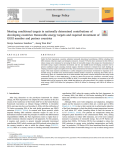
Coastal adaptation investment presents clear opportunities for social welfare improvements, particularly for densely populated areas with high levels of economic activity. This policy brief, Leveraging Public Finance for Coastal Adaptation, provides insights into several mechanisms for leveraging public finance of coastal adaptation. Leveraging public finance refers to achieving increased outputs with the same amount of public investment. Given constraints on public finance, leveraging public finance is increasingly important for achieving coastal adaptation. Promising mechanisms for leveraging public investments in coastal adaptation include generating market revenues or increasing tax revenue through projects that produce co-benefits such as new land or improved environmental quality. A further mechanism for leveraging public investments is through long-term contracting of the private sector, which can improve the efficiency of adaptation project delivery. Each mechanism is illustrated through an example analysed in the GREEN-WIN project.
This policy brief, Disruptive Innovation and Win-Win Strategies for the Sharing Mobility Economy, published as part of the Green-Win project provides insights into the disruptive innovation of the sharing economy which is occurring in the urban mobility sector. Sharing mobility promotes win-win strategies that aim to provide short-term socioeconomic benefits and longer-term environmental impacts through mitigation and adaptation gains and therefore to enhance sustainable development in cities. Disruptive innovations, like mobile apps can coordinate on-demand vehicle and ride sharing at unprecedented scales, transforming urban mobility. Although social and technological sharing innovations may address multiple urban problems, there is an ‘adaptive lag’ in governance which is fostering new environmental problems. A collaborative governance regime to support win-win sustainability strategies in the shared mobility sector is needed between mobility companies, users and the public, and city governments. The analysis is illustrated through examples investigated in the Green-Win project.
Climate change does not only pose increasing risks to local livelihoods and economies, but also provides a large array of opportunities for social innovation and international collaboration. Any attempt at limiting global warming below will require new forms of green businesses and of economic collaboration. This is especially the case in rural and poor areas of the world where there is a major potential for societal-climatic positive transformations.
This policy brief, Transformative Narratives for Climate Action: Win-win strategies linking climate and sustainable development goals, discusses the key role of Transformative Narratives for catalysing climate action and elaborates some of the empirically-grounded transformative narratives produced in the GREEN-WIN project. In particular, the brief emphasises that win-win strategies that meet climate and economic goals can provide the basis for transformative narratives that are key to catalysing climate action. The brief discusses transformative narratives based on win-win strategies in the areas of rural energy poverty eradication, urban sustainability, and adaptation infrastructure. Additionally, the brief examines policies for scaling up win-win strategies like knowledge sharing, collaboration with domestic and international networks, and capacity building.
